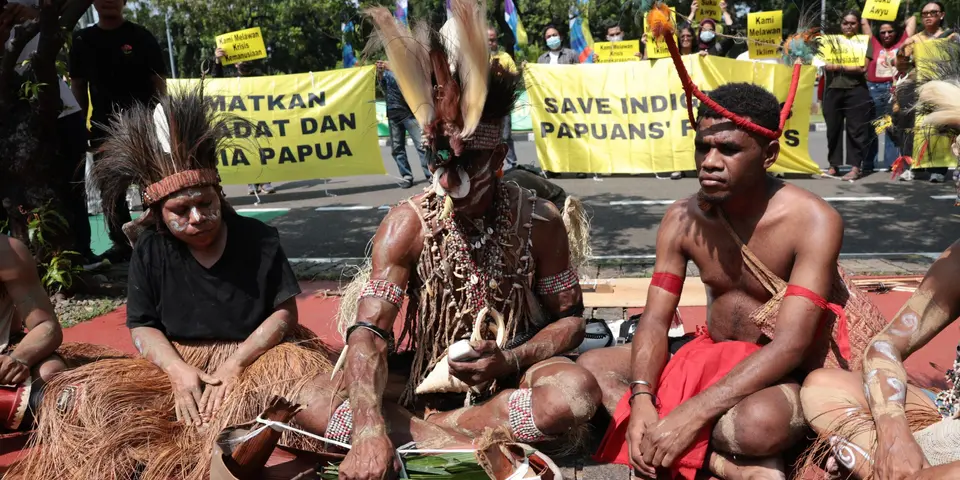
Southeast Asian Lawmakers Stand with Indigenous Communities in Indonesia, Demand Investigation into Human Rights Abuses and Environmental Destruction in Merauke PSN Projects
March 28, 2025

Jakarta, 28 March 2025 – ASEAN Parliamentarians for Human Rights (APHR) denounces the ongoing human rights violations and land grabs associated with Indonesia’s National Strategic Projects (PSN) in Merauke, Papua. These projects, which encompass extensive agricultural and infrastructure developments, are being implemented without adequate consultation with affected communities, resulting in profound social, environmental, and cultural harm.
APHR is alarmed by recent reports that indigenous communities in Merauke are being forcibly displaced from their ancestral lands to make way for PSN projects. Civil society organizations have raised urgent concerns about the disastrous impact of these developments on indigenous rights, environmental sustainability, and social justice.
“Dispossessing indigenous communities of their ancestral lands without their free, prior, and informed consent is a blatant violation of human rights,” stated Rangsiman Rome, APHR Board Member and Member of Parliament from Thailand. “These so-called strategic projects are little more than state-sponsored land grabs, trampling on the rights of local populations and erasing their cultural heritage in exchange for super profits is a scam against marginalized communities.”
The Merauke Integrated Food and Energy Estate (MIFEE) and other large-scale initiatives have long been criticized for displacing indigenous Papuan communities, destroying forests, and devastating ecosystems. Local groups, including the Auyu and Marind peoples, have consistently expressed their opposition, demanding that the government respect their rights and cease the destruction of their lands.
In addition to direct violations of land rights, these projects pose a significant threat to the environment and the livelihoods of local communities. Rampant deforestation, water contamination, and loss of biodiversity are just a few of the destructive consequences. Greenpeace and other environmental organizations have documented how the expansion of monoculture plantations and infrastructure is decimating sacred lands and vital ecosystems.
“These so-called development projects are a dual assault on human rights and the environment,” said Arlene Brosas, APHR Board Member and Member of Parliament from the Philippines. “Economic growth cannot come at the expense of indigenous sovereignty or ecological sustainability. The government’s blatant disregard for these communities’ voices is profoundly troubling and unacceptable.”
One of the most alarming aspects of these projects is the systemic failure to consult meaningfully with affected communities. Despite repeated objections from residents and local leaders, their voices have been ignored. The lack of transparency surrounding the planning and implementation of these projects only deepens mistrust and fosters resentment.
“It is unconscionable that decisions affecting the lives and futures of indigenous peoples are made without their input or consent,” said Wong Chen, APHR Board Member and Member of Parliament from Malaysia. “This disregard not only violates Indonesia’s legal obligations but undermines the very principles of democracy and human dignity.”
The situation in Merauke is not an isolated incident. Across Southeast Asia, indigenous and marginalized communities are routinely displaced under the guise of development, with scant regard for their rights or welfare. From hydro power dams in Laos to palm oil plantations in Malaysia, the recurring pattern of land grabs and environmental degradation continues to be fueled by powerful corporate interests and state actors, with little accountability or oversight.
APHR calls on the Government of Indonesia to:
-
Immediately halt all PSN projects in Merauke and conduct a thorough, transparent investigation into the human rights violations and environmental impacts.
-
Respect the rights of indigenous communities by ensuring free, prior, and informed consent in all development projects.
-
Establish robust and transparent mechanisms for community participation and grievance redress.
-
Review and reassess the PSN framework to ensure that development projects do not infringe upon human rights or cause irreversible environmental harm.
APHR urges ASEAN and the international community to hold Indonesia accountable for its actions and advocate for the protection of Indigenous rights and environmental justice. ASEAN, particularly the ASEAN Intergovernmental Commission on Human Rights (AICHR) must not ignore the growing trend of land dispossession and environmental destruction in the region.
“The Indonesian government must understand that true progress is not measured solely by infrastructure or investment, but by the well-being of its people and the protection of their fundamental rights,” said Charles Santiago, APHR Board Member and former Member of Parliament from Malaysia. “If the government continues down this path, it risks eroding its legitimacy and the essential rights of its citizens.”
APHR stands in solidarity with the indigenous communities of Merauke and all those fighting for their rights and dignity. We call on the Indonesian government to uphold its obligations under international human rights law and ensure that development does not come at the expense of people’s lives, cultures, and the environment. #
ASEAN Parliamentarians for Human Rights (APHR) was founded in June 2013 with the objective of promoting democracy and human rights across Southeast Asia. Our founding members include many of the region's most progressive Members of Parliament (MPs), with a proven track record of human rights advocacy work.